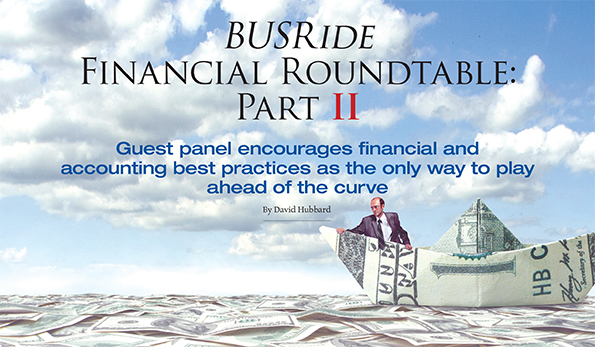
Guest panel encourages financial and accounting best practices as the only way to play ahead of the curve
By David Hubbard
In February, BUSRide convened with a select group of financial leaders in the bus and motorcoach industry during the UMA Motorcoach EXPO in Los Angeles, CA, for a roundtable discussion on the issues, trends and practices that affect operators’ borrowing, acquisitions and all-round financial health.
Part II of the conversation focuses on factors that influence lending decisions and suggestions for operators to improve their financial capabilities and better their chances for sound financing.
—————————————————————————————————————————————
YOU MIGHT ALSO LIKE:
- BUSRide Financial Roundtable: Part I
- The Motorcoach Marketing Council gets its kits together
- Prevost celebrates 90 years
—————————————————————————————————————————————
The panelists at the table were:
Gregg Goedde, Vice President, ABC Financial Services (a division of ABC Companies), Faribault, MN
Eric Coolbaugh, Principal, Advantage Funding, Lake Success, NY
Lee Steinberg, Sales, Commercial Transportation Division, Advantage Funding, Lake Success, NY
Raymond Sullivan, National Sales Manager, Industrial Group, EverBank Commercial Finance, Hampton, NH
Dave Reynolds, President and CEO, Fleet Financing Resources, Riverside, CA
Garland Tillery, Senior Finance Officer, Fleet Financing Resources, Riverside, CA
Michael Denny, Vice President and General Manager, Motor Coach Industries (MCI) Financial Services, Dallas, TX
Matt Hotchkiss, Vice President, Commercial Vehicle Group, Wells Fargo Equipment Finance, Inc., Minneapolis, MN
What financial challenges do you most frequently help operators overcome?
Matt Hotchkiss: The biggest challenge for us to approve financing is operators that have too much leverage. In a soft market, companies that have a highly leveraged fleet almost always struggle. What I mean by leverage is that they borrow the maximum amount for the longest term, they owe money on most or all of their fleet, and never are in an equity position. They are the first ones to struggle and the first ones to fail during a difficult cycle. This could be something as simple as bad weather or something bigger like a recession. An operator should always be in a position to liquidate assets if it becomes necessary to access cash and reduce debt.
Eric Coolbaugh: Getting customers to produce good quality interim statements is a challenge we face. When an operator is looking to buy a new coach in November and all he hands over is last year’s tax return, any credit person is going to want something more current. The perfect package is a detailed business plan, with a profit and loss statement with balance sheet.
What would make life easier for you and also improve operators’ chances at getting better financing?
Ray Sullivan: I think the service from the provider to the end user in this particular vertical sector is quite good. However, when we have a customer who wants a $350,000 bus and all he can show is a tax return, I tell them to help us out with an interim statement.
Hotchkiss: The quality of financial statements is so important. Not only does it help us clearly understand the financial health of the business but having CPA-reviewed or audited statements validates the numbers we see. It adds instant credibility from a risk analyst perspective.
Gregg Goedde: There is the financial side, but there is also the story. A $1 million dollar loan requires more than just the financials. What makes this deal make sense? What makes this company unique? Or, if there are issues, what has the operator done to find a solution and remedy the problem? These are areas we also explore.
Garland Tillery: For a customer to have this level of comfort and understanding of what the business is all about is not an unreasonable expectation.
In your experience, are operators as a group becoming better businesspeople?
Tillery: Regardless of the tools and technology, keeping good records is a discipline. It’s no different than scheduling maintenance on the coaches. Unfortunately I would say for many operators in this industry, this discipline is further away from their core competencies; so they have to work a little harder, if necessary, to educate themselves in the areas they are lacking to make them better businesspeople.
Goedde: In my experience, I can get a pretty good sense of an operator’s business savvy and the degree he understands his operation after interacting with him for five minutes. With just a quick read of the financial statement in the package I receive from a potential borrower, I am able to judge a book by its cover.
Michael Denny: There are operators we deal with that may run 30 or more coaches, knowing what each must produce. They know what each asset earned every single month. They look at their fleet and, if it is not showing good utilization, will actually change the portfolio dynamics to make better use of each unit. They are that sophisticated.
Tillery: What we have noticed from some of the top-tier operators we do business with is that the 2008 recession forced them to get better reporting habits. There was no unavailability of funds. Most banks curtailed their lending so, after that recession, unless an operator came to the bank with a real sophisticated product, he wasn’t getting anything. There was not a lot of buying going on at that point, but there was still business to be done. We have seen a lot of people who went through the recession and actually came out better.
What specifically do you do to ensure your customers obtain the best financing possible?
Hotchkiss: We want to be a financial advisor when appropriate. Sometimes that advice may steer a deal away from our company if it makes better sense for the customer. We’ve been in this industry for a long time and have a good reputation. Our customers trust us and know we’re more interested in the long-term relationship than the transaction. I believe that goes a long way in this business.
Sullivan: We go in wanting to do the absolute best for each customer, but we can only rely on the quality of the information and the neatness of the package we receive. In many cases, if we know why the operator is replacing units, the reason for the purchase, or we have a brief overview of what they are trying to achieve and what their business goals are, it makes it easier to know how to help.
Goedde: What we have found of both large and small companies that have gone through this, they learn to see the areas in which they can improve their business. They get in touch with the actual costs of their operations, and the process is enlightening. When that light goes on, we can help take their business to the next level.
Denny: I think the message here is to help our customers understand their options and put together a good business plan that reflects an understanding of their operating costs. It’s making sure that, as they buy the full range of products, they get the right return in order to sustain the business.
What programs and practices does your company provide to make financing an easier, more inviting and less painful process for operators?
Hotchkiss: We — not only me, but the credit and documentation people at our company — understand this industry, because we aren’t asking questions we should already know. We include an Equipment Line of Credit that allows for multiple purchases over time.
Do lenders such as yourselves run any sort of risk in enabling operators’ bad habits in managing finances?
Goedde: Most of us in this room have worked with operators in this industry for so long that we may be proliferating our own problems, in a way. We will often tell operators who come to us that regardless of their accounting practices, we still need to get them that bus. We need to find the money. Maybe they can’t show us financials as solid as we would like, but they can come up with another $10,000 for the down payment. At this point, it becomes an equity play, and the value of the motorcoach and collateral almost proliferates that issue as well.
Hotchkiss: This industry went through a difficult cycle in the early 2000s. There were many factors that caused this, but loose credit standards and easy money were contributors. From our standpoint, we as a lender don’t want to be an enabler to that type of cycle.
Banks are healthy today and are looking for markets to deploy their capital, which makes it a competitive marketplace. Despite this competition, we want to maintain consistent credit standards. We won’t extend amortizations or sacrifice credit quality to win business.


MOST NEED OF THE OUR FOR EVERY BUS OPERATOR IN THE ENTIRE WORLD,S SLOW DOWN IMPACT